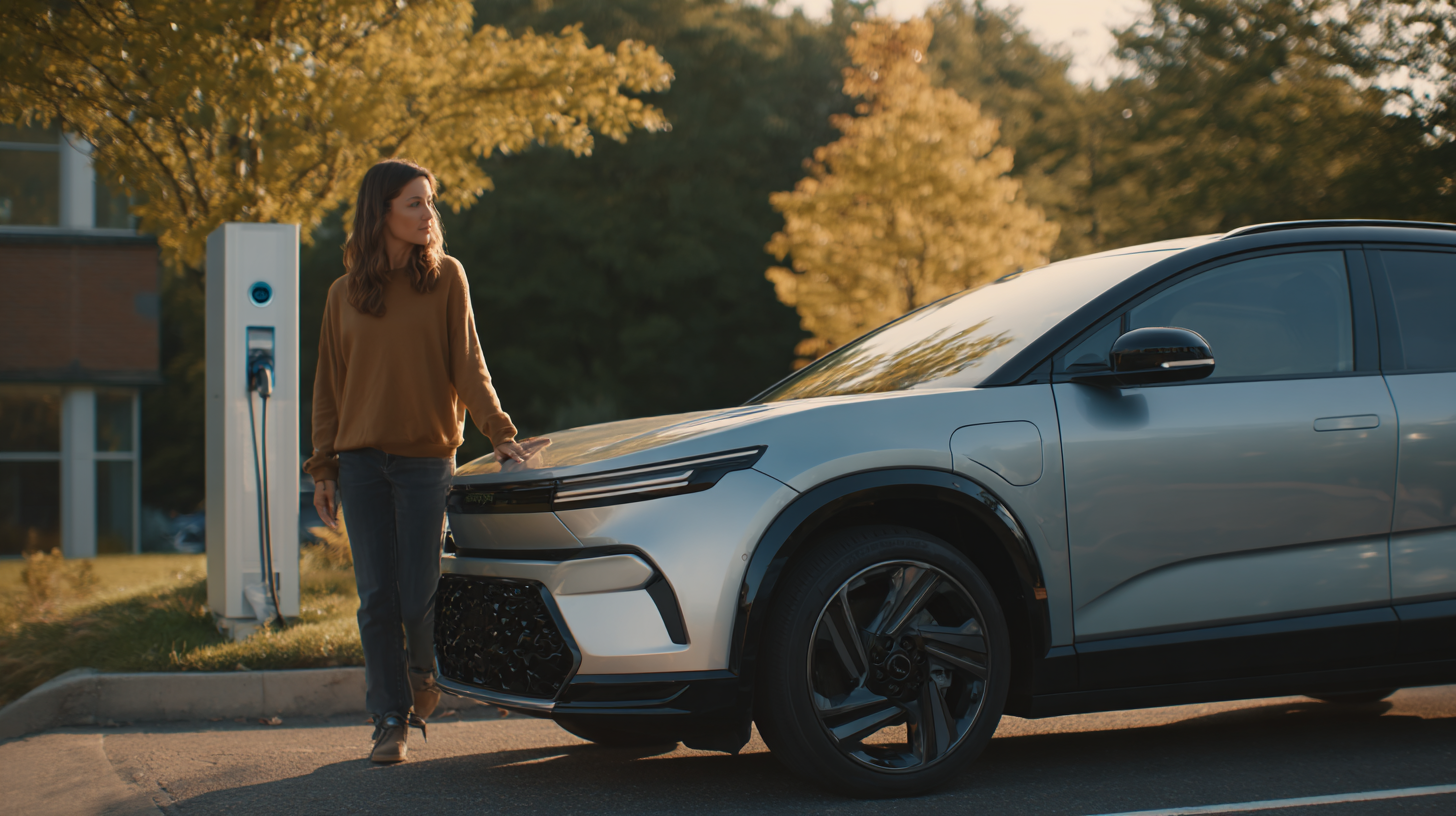As the world increasingly shifts towards sustainable practices, the future of eco-friendly travel is bright, particularly with the rise of PHEV SUVs (Plug-in Hybrid Electric Vehicles). According to a report by the International Energy Agency (IEA), the global market for electric vehicles, which includes PHEV SUVs, is expected to reach over 125 million units by 2030. This growth reflects a significant trend towards reducing carbon footprints while maintaining the convenience and versatility that SUVs offer. Moreover, recent studies from the Department of Energy indicate that PHEV SUVs can reduce greenhouse gas emissions by up to 45% compared to traditional gasoline vehicles, making them an attractive choice for environmentally conscious consumers. With the added benefit of lower operating costs and government incentives, adopting PHEV SUVs for daily commuting not only promises a greener future but also aligns with the increasing demand for sustainable transportation solutions in urban environments.

 The rise of plug-in hybrid electric vehicles (PHEV SUVs) represents a significant advancement in eco-friendly travel. These vehicles blend the efficiency of electric motors with the versatility of traditional combustion engines, allowing users to experience reduced emissions without sacrificing range or performance. One of the key benefits of PHEV SUVs is their ability to operate on electric power for shorter commutes, markedly lowering the environmental footprint for daily travels. By utilizing electric mode for short trips, drivers can significantly cut down on gasoline consumption and greenhouse gas emissions.
The rise of plug-in hybrid electric vehicles (PHEV SUVs) represents a significant advancement in eco-friendly travel. These vehicles blend the efficiency of electric motors with the versatility of traditional combustion engines, allowing users to experience reduced emissions without sacrificing range or performance. One of the key benefits of PHEV SUVs is their ability to operate on electric power for shorter commutes, markedly lowering the environmental footprint for daily travels. By utilizing electric mode for short trips, drivers can significantly cut down on gasoline consumption and greenhouse gas emissions.
Moreover, PHEV SUVs offer the flexibility of longer trips without the anxiety of finding charging stations, thanks to their gasoline engines. This dual-fuel capability makes them an ideal choice for families and individuals who seek a sustainable commuting solution while still maintaining the convenience of traditional vehicles. Additionally, PHEV SUVs often come with various incentives such as tax rebates and access to carpool lanes, further promoting eco-friendly travel. As more consumers recognize the benefits of PHEV technology, the transition towards sustainable commuting becomes more achievable, paving the way for a cleaner and greener future.
As the automotive industry rapidly transitions towards electrification, optimizing fuel efficiency for daily commutes has become more crucial than ever. The latest advancements in Plug-in Hybrid Electric Vehicle (PHEV) SUVs illustrate a significant leap in technology, combining the convenience of electric driving with the flexibility of hybrid power. For instance, the new generation of popular SUVs boasts impressive specifications, including a robust 320 horsepower and an impressive electric range of up to 150 km. These features make them not only practical for city driving but also suitable for longer journeys without the anxiety of running out of battery.
The ability to charge these vehicles quickly—achieving 80% charge in just 30 minutes—further enhances their appeal for daily commuters. This rapid charging capability allows drivers to integrate electric commuting into their routine seamlessly, significantly reducing fuel consumption and emissions. As urban populations grow and environmental concerns become more pressing, PHEV SUVs present a sustainable alternative that caters to the needs of modern commuters, paving the way for a greener future in transportation.
When considering eco-friendly travel, selecting the right Plug-in Hybrid Electric Vehicle (PHEV) SUV is crucial to meet your sustainable commuting needs. These vehicles offer the flexibility of electric driving combined with the convenience of a gasoline engine, making them an ideal choice for those looking to reduce their carbon footprint while maintaining mobility. Factors such as electric range, overall efficiency, and size of the vehicle should guide your decision-making process.

Tips: When choosing a PHEV SUV, assess your daily commuting distance to ensure that the electric range meets your needs. Look for models with a high MPGe (miles per gallon equivalent) rating, as this indicates better efficiency and lower environmental impact. Additionally, consider the availability of charging stations in your area to maximize the benefits of electric driving.
Another essential aspect is evaluating the interior space and comfort features of different PHEV SUVs. Depending on your lifestyle, you’ll want an SUV that accommodates both passengers and cargo effectively. Prioritize vehicles that offer advanced technology for a seamless driving experience, such as regenerative braking systems and smart energy management features. With the right choice, you can embark on a journey toward more sustainable travel without sacrificing comfort or convenience.
For owners of Plug-in Hybrid Electric Vehicle (PHEV) SUVs, understanding the nuances of charging and maintenance plays a key role in maximizing their eco-friendly commuting experience. One essential tip is to establish a regular charging routine. Utilizing home charging stations during off-peak hours can significantly reduce energy costs while ensuring that your vehicle is always ready for daily use. Additionally, taking advantage of public charging infrastructure not only enhances convenience but also contributes to a greener energy grid.
Maintenance for PHEV SUVs involves unique considerations compared to traditional vehicles. Regularly checking the battery health and maintaining the electric and gas drivetrain can optimize performance and efficiency. Owners should also ensure that they keep tire pressure at recommended levels to improve hybrid efficiency. Staying updated with software upgrades from the manufacturer can enhance vehicle performance and battery management, providing further eco-friendly benefits. With these strategies, PHEV SUV owners can enjoy sustainable commuting while extending the life and efficiency of their vehicles.
| Attribute | PHEV SUV Benefits | Charging Tips | Maintenance Tips |
|---|---|---|---|
| Fuel Efficiency | Higher MPG in hybrid mode | Charge regularly at home | Schedule regular battery checks |
| Emissions | Lower CO2 emissions | Utilize public charging stations | Monitor tire pressure regularly |
| Cost Savings | Savings on fuel costs | Use off-peak charging hours | Keep software updated |
| Driving Range | Extended range with hybrid option | Plan trips around charging locations | Regularly check brake condition |
In today's world, integrating eco-conscious practices into travel routines is becoming an essential part of sustainable commuting. Utilizing PHEV SUVs (Plug-in Hybrid Electric Vehicles) can significantly reduce carbon footprints, especially for those who prioritize both convenience and environmental responsibility. With the rise in sustainable transportation options, travelers can make choices that not only enhance their experience but also contribute positively to the planet.
Beyond vehicle choice, travelers are encouraged to adopt mindful practices while on the road. For instance, investing in durable, sustainably made backpacks can streamline packing while minimizing waste. Additionally, engaging in strategic planning, such as opting for train travel instead of air travel when feasible, can further lessen environmental impacts. The push for sustainable tourism is also evident in locations like Tulum, where initiatives aim to balance growth with cultural preservation. As travelers become more aware of their impact, the integration of eco-friendly practices into everyday travel is no longer a trend; it is a necessary evolution toward a more sustainable future.
